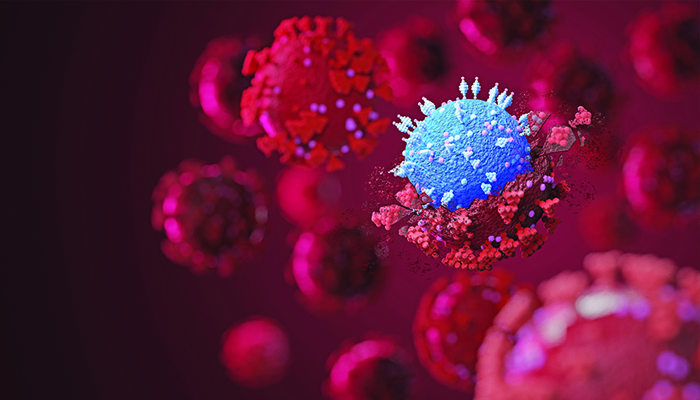
Muscat: Adequate preparation, resilient and reliable healthcare system and self-reliance are the three main lessons that Oman and other countries around the world can learn from the COVID-19 pandemic.
While listing the lessons, Dr Zaid bin Al Khattab Al Hinai, a consultant on paediatric infectious diseases at the College of Medicine and Health Sciences at Sultan Qaboos University (SQU), said “almost two years have passed since the COVID-19 pandemic swept the whole world, killing millions of people, besides causing economic losses in billions.”
“It has been considered the most critical pandemic in contemporary human history since the Spanish flu in 1918. However, it is the time to stop for a while and consider some key lessons that has to be learnt from the pandemic.”
In his write-up in ‘Scientific Insights’, a periodical newsletter of Oman’s Ministry of Higher Education, Research and Innovation (MOHERI), Al Hinai said the first lesson to be learnt is that similar pandemics will occur in the future, and it is every government’s duty to remain prepared for it.
“For anyone who specialises in epidemiology, the COVID pandemic was predictable,” wrote Al Hinai, who also serves as an assistant professor at SQU. “I clearly remember a lecture titled ‘What germ will cause the next pandemic?’ by Dr Anthony Fauci at an infectious disease conference that I attended four years ago.
“Dr Fauci emphasised at the time that a future pandemic is inevitable,” he added.
“The questions is: When? How severe will it be? What germ would it be? Dr Fauci listed a slew of viruses and said that he expected the pandemic to be due to one of these viruses, mentioning corona and influenza among them. He said these viruses are characterised by their quick mutation and that they are found abundantly in animals.”
Al Hinai explained that all that is required for a pandemic to occur is for one of these viruses to pass from animal to human, having a mutation that allows it to be transmitted between humans. The occurrence of future pandemics is expected and natural, he said, and everything we can do must be done to ward off their occurrence.
Lesson number two for countries to learn is that a nation’s healthcare system is an essential part of a country’s national security system and infrastructure.
“Countries take a risk when they reduce the capability of the health system, while relying on the private sector,” revealed Al Hinai, pointing to the United States being the country that has had the most number of people who died from COVID, despite being an advanced country where the best treatment and medicines against the pandemic can be found. According to the John’s Hopkins Coronavirus Resource Center, the US has reported 866,540 deaths from COVID.
“The reason for the failure is that the United States lacks an integrated public health system,” he said. “The public health system needs to be significantly legalised at the federal level, and infected people must be prohibited from entering the international borders. All these factors hindered the ability of this great country to properly confront the pandemic.
“Learning from what happened in the US is of great significance,” he went on to add. “A key lesson to be learnt is that the public health system is a foundation to be strengthened at all times as achieving health security is an essential step towards national security.”
The third lesson Al Hinai wanted to emphasise is the need for countries to be more self-reliant. Economic disruptions caused by the pandemic strongly affected many supply chains. In this regard, he used the example of the slow rollout of vaccines to many parts of the world to corroborate his reasoning.
“There have been a lot of talks recently about food security and medicine security,” he said. “This means that every country must secure its needs for food and medicine, preferably through using internal sources so that it does not find itself in a predicament if a crisis occurs and external supply is cut off.
“Indeed, we experienced this predicament at the beginning of the pandemic when we faced difficulty in importing diagnostic solutions, and again in the delay in obtaining anti-COVID vaccines,” he revealed. “These delays greatly hindered the control of the pandemic. Without a diagnosis, it was difficult to detect and isolate infections. While we waited for vaccines, the Delta strain has spread and claimed thousands of lives.”
Al Hinai urged countries to focus on investing in scientific knowledge and research so that vaccine research and live-saving medicines could be developed faster, leading to easier availability and better distribution of these vital supplies.
“If we look at Oman today and ask ourselves: what is the area in which we suffer from a severe shortage or deficit? In my view, we fall behind mostly in the scientific field,” said Al Hinai. “The pandemic has made this deficiency and the complications arising from it apparent to those who see it.
“We have to foster our intellectuals and invest in developing scientific outputs, aiming to be one of the leading countries in this area,” he said. “We have to reach a level of science that secures the economy and industries of the future, gives us the confidence needed to face all kinds of challenges and empowers us to exert our best efforts to achieve scientific security.”